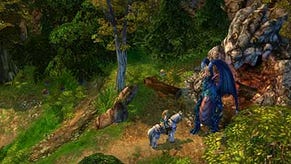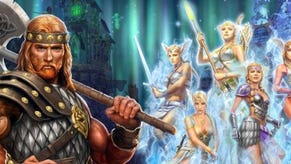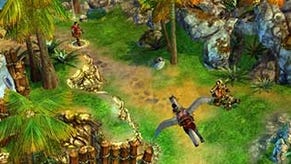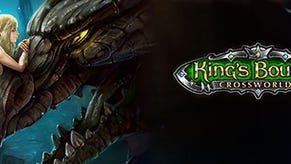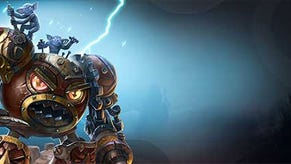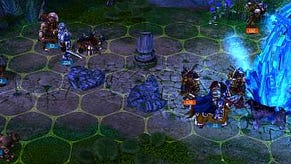When Legends Fade: A Farewell To King’s Bounty
I’m amazed that it took me so long to realise how I should really be spending the three weeks I recently spent offline thanks to a feckless ISP. Reading, walking, meeting exciting new people? Nah. Finally finishing King’s Bounty, my favourite game of 2008, but one that proved so long and so sadly short on its early hyper-enthusiasm in its later hours that I’d had to put it down long before its conclusion. If you wonder why I was quite so keen on this Vladivostok-developed RPG-strategy underdog, I’d much rather point you here, here and here than summarise myself again. Oh – it’s finally on sale at retail in the UK by the way, so you needn’t fret about the unreasonable Euro pricing for the download versions anymore.
Below is a slightly maudlin account of my final days with King's Bounty - it includes spoilers of a sort, not that I can believe anyone was really in this game for its cheerfully incoherent plot.
With no access to Steam thanks to an offline mode balls-up and most of my boxed games in storage, my gaming options were minimal. Times were desperate. A few days ago, however, I had something of a facepalm moment when I remembered my PC had another Windows installation on a second hard drive, and one that was loaded up with non-Steam games. Including King’s Bounty, and that cliffhung savegame of mine. Back I must go.
I’d left off in Demonis, King’s Bounty’s visually fun but otherwise dull demon realm. It’s a world of floating rock lifts over lava rivers, of Succubi able to charm away opposing armies, of fireball-hurling imps and of spiders that were just like the non-demon spiders but a different colour. I’d run into King’s Bounty’s major failing – that enemies in a new area always seemed way beyond your own army’s abilities, offering you the miserable choice of a sound beating or tiresome backtracking around all the sidequests you hadn’t yet completed to earn some more precious XP. KB is a nearly-game, its great accomplishments usually deflecting its more unfortunate design choices. That occasionally it’s too much like wandering your World of Warcraft twink into an area that’s far too high-level for him is a mishap that gets harder to ignore as the game wears on.
By this stage, I’m quite attached to my army. I’ve found a few favourites amongst KB’s impressive selection of weird’n’wonderful beasties. Fairies, solely because I can field several thousand at once (and also panic/cheer when hundreds die in a single attack). Ancient Ents, stupidly slow but stupidly powerful – most especially with their long-range wasp attack. Killing demons by throwing wasps at them will always be funny. The Dwarf Alchemists, with their trio of specialist poisons, each super-punishing against particular enemies. Necromancers, able to turn any fallen units into a chattering skeleton, pustulent zombie or wailing ghostie fighting for Team Alec. And, boringly, a few human Knights, cos they’re pretty good at thumping stuff.
I was proud of Team Alec, and I’d worked out a just-so first round order of attack that was often pretty devastating. Team Alec, unfortunately, was almost entirely wiped out after just a couple of fights in Demonis. See you, chaps. I replenished my supplies with randoms from Demonis’ own plentiful army stores, and back to war I went. So it continued, a pattern of grinding through slightly too difficult fights that generally involved losing most of my guys in the process. While I was progressing, I felt guilty about it – at this stage of the game, my fights should be as much about minimising casualties as dishing out damage. Instead, I’d become the worst, most callous kind of general, treating my poor troops as disposable sacrifices. I could perhaps call it noble utilitarianism, but at this point I wasn’t aware it was all leading up to saving the world of Endoria. It was just about me earning gold and xp.
I crawled across Demonis, leaving a trail of my followers’ corpses in my wake. I bought up the entire realm’s stock of Succubi, Imps, Cerberuses and Archdemons, which surely put a crimp in the demons’ plans to invade the Dwarfs. I flirted with a demon princess – but, by this point, encountering some fantasy female who fell for me on sight in every new zone I wandered through was a foregone conclusion. I stole dragon eggs for a satanic collector of rare species. Other than that, the merry madness that so endeared to the game for its first dozen-odd hours was entirely absent.
This doesn’t stop from recommending the game to anyone: it’s truly great for long enough to justify the purchase. Even once the ideas have run out, it slowly blossoms into something more tactical than before. Rapidly running out of money due to my constant need to reinforce, I instead concentrated on playing better. My spell choices were no longer simply a matter of which I had enough mana for, or which would deal out the most damage most quickly, but of arranging elaborate complementary combos. Nullify rather than attack the most dangerous enemies, calculate common units’ greatest weaknesses, and even stuff as simple but crucial as arranging various obstacles between serious threats and my frail back-row support troops. Dropping a piece of rock onto a couple of hexes is hardly spectacular, but if that phalanx of 300 demons has to smash through it to move forwards, that’s one turn in which they can’t thump some of my guys to death.
In other words, I wasn’t having quite as much fun as before, but I become an awful lot better at the game. Its difficulty is a black mark against the gme, but it became increasingly clear that it’s not simply a case of Katauri Interactive being big meanies. Rather it’s that they’ve made a game that’s a whole lot more tactical than the cheerful, superdeformed art style implies. With my strategy hat on at last, I still lost of lot of good men, but generally I’d come out the other end of a fight with the bulk of my army still on their feet. I discovered recently that the British army had almost no concept of frontline medicine or barracks hygiene until the First World War. Even as late as the Crimean War, vastly more men died as a result of disease and malnutrition than did those on the battlefield. Basic ventilation and sanitation more or less ushered away the typhus and cholera that had gone hand in hand with warfare. Late in the game, I’d had a similar revelation – a few astoundingly logical changes meant far fewer meaningless deaths. I was, at last, a worthy general.
It remained a slog. Following Demonis was Haas’ Labyrinth, a lazy hotch-potch of earlier zones crammed into an irritating teleportational maze structure, and patrolled by viciously tough dragon armies. It’s about here that my plan to simply play better falls apart, and what’s more there’s finally an admission, of sorts, that the balance is off. The Labyrinth is inexplicably full of army shops, which doesn’t make any sense even by KB’s agreeably broken logic. Do the dragons who rule this maze want to be slayed? So it becomes this constant killing and shopping cycle, and it’s not long before I’m actively praying for the game to end. The ideas are long gone, lost to a lonely, MMO-like grind.
I can barely remember the next day of playing. After many hours in dragon-maze I stumbled into a small orcish kingdom, reliably patrolled by armies just a little bit too tough. Somehow I pushed through. Somehow I made it to the first new visual idea this once splendid game had offered for hours. A giant orc and his giant spaceship. Of course, there was a fight, but sadly against Just Some Orcs rather than the jolly green giant there. My reward? The following-up of an earlier reference that I’d hoped was just a one-shot gag. Endoria is a land atop a giant star-turtle. I’ve said before that King’s Bounty is in many ways a paradigm of PC gaming, one that harkens back to the old ways, before Doom changed everything. A gratuitous Discworld reference only compounds that, I guess, but it seemed such a sad resolution after the earlier humour of zombie wives and frog-fetishists.
The final fight was fought atop the star turtle’s scaly head, in theory against some ultimate dragon with indistinct plans of Armageddon. In practice, it was a simply a battle against a lot of dragons – no boss fight, no epic final encounter, just a hard, hard slog. It was, admittedly, the toughest battle of the game, with a sense of high stakes. I had to attempt it some five times until, finally, the battlefield came down to one enemy Ogre and one enemy Ent. All my troops had been wiped out long before, but I’d eked out the Mana and Rage enough to summon a few temporary warriors. A single skeletal dragon raised from a fallen enemy Red and the usual useless Ice Orb were all I had. For turn after turn, I had them either deal out pitiful amounts of damage or scarper around the screen until enough mana had recharged to cast the Necromancer spell again. It was David vs Goliath, only Goliath’s forehead was made of steel and David was a coward. My feeble slingshot wore the brute down with agonising slowness; should he ever connect with my tiny frame, it would all be over.
It was relief, not joy, that I felt when that last Ent finally toppled. I’d saved the world, but all I cared about was that I didn’t have to see that colourful screen full of hexes again. Now I’m away from it, I miss it terribly, and my brain seems to have blocked out the trauma of those last few days, leaving me with the memories of that first glorious week with King’s Bounty. Even if a relationship might eventually become loveless, the good times of its earlier days aren’t invalidated. It’s still my favourite game of last year, but the same can’t be said for the bits of it I played this year.
Really, King’s Bounty should be half the length it is; even after a good 60 or 80 hours with it, I still had sidequests left unfinished. The pirate, elven and undead realms could be excised entirely and it’d be a better game for it, surely far more able to sustain its early good ideas through to the end.
So my feelings about upcoming expansion Armoured Princess are decidedly mixed. It’s an opportunity to make a leaner, better-balanced game, hopefully replacing its parent’s bloat with focus. There’s also the terrible chance it’ll make similar mistakes to STALKER: Clear Sky – a loss of quality control in the name of rapid fan service. If I’m to revisit Endoria, it’s because I want to be entertained, not because I want to fight a thousand more battles.






